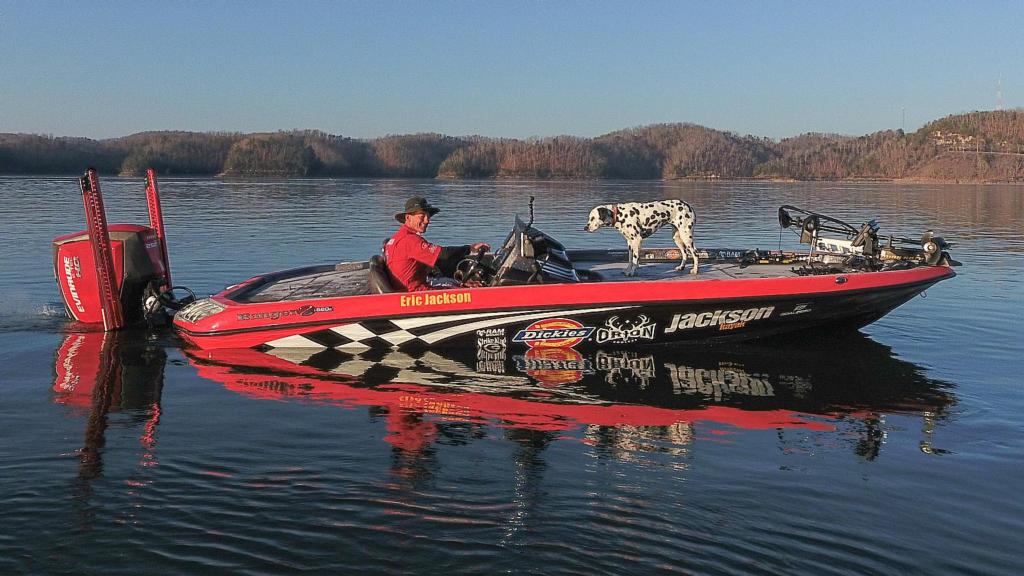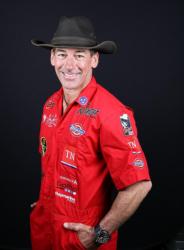Approaching Sponsorship and a Career in Fishing
Eric Jackson’s tools for turning pro and surviving, regardless of earning prize money

(The writer's opinions and observations expressed here are his own, and do not necessarily reflect or represent the views, policies or positions of FLW.)
Most bass fishing professionals have many times the tournament experience that I do. However, I have 30 years of experience at supporting myself in professional kayaking – a sport where prize money can’t pay the expenses of participating, so sponsorship, instruction and other methods of earning money through kayaking are required to survive.
My knowledge, skills and confidence in working with sponsors and generally being able to support my young family and myself was not something that came easily to me. I had to learn the hard way without helpful advice and by going from one failure to the next over many years.
There was no such thing as a professional kayaker when I was trying to be one. Kayaking events didn’t have much media coverage, and there weren’t really any athletes with any sponsors at the time. When I got started I lived at poverty levels, was evicted out of most of my rentals, saw every car I bought with a loan be repossessed, and had to hock camping equipment and other gear to buy diapers and baby food for my young daughter more than once.
Times have changed, however, as my desire to kayak full time and my ability to support my family through kayaking increased, and my results increased with them. I have represented some of the biggest consumer brands through my kayaking, and over the years there have been many major brands that have helped me learn the ropes – and learn to represent them in a way that assured that each year it got easier.
What I am about to share below, I would have given my right hand to know 30 years ago. I hope you can put some or all of this information to good use for your own career. Now, running Jackson Kayak, I use sponsored team members to market our products worldwide, so I understand the sponsorship game from both sides of the coin.
Be authentic, be yourself, be nice
First off, there is only one person you can act like and be 100 percent of the time, and that is you. Everyone is special in his or her own way and is likable, as long as you’re not concerned about trying to get others to like you by trying to be cool. If you are like many people who try to act a certain way in public, rethink that idea and try acting the same way you would when you are the most comfortable at home with your family and closest friends.
In the long run if you are not being nice, helpful and caring toward others you will struggle to get anyone to support you unless you are so dominant on the water that you can afford to be a jerk. And even then you are giving up lots of opportunities.
Humans are conformists, and tournament bass fishermen are an example of that. This isn’t a bad thing, but it is something you better come to terms with if you want to be marketable. If you try to blend in, versus being unique, you hurt your chances of success. Trying to stick out for the sake of sticking out isn’t required, but you would be surprised at how much time you spend trying not to stick out. If you do things differently people will notice, including sponsors, but only if your own way makes sense and isn’t fake.
For example, I come from a different sport, different lifestyle and have years of being myself under my belt. For lack of a better way to put it, I am weird by many people’s standard. Before I entered my first FLW tournament as a co-angler, I looked online and saw that everyone was wearing what I called NASCAR-style jerseys and ball caps. I didn’t know anyone by face, so in every photo I saw of a group of fishermen that looked like they were all the same, and I only could tell the difference by the sponsors on their jerseys.
That is why I decided to create my own brand and look. I am a big fan of Dickies clothing and wanted to have one piece of clothing for fishing that I throw on in the morning and don’t have to think about again. I chose red Dickies coveralls and a Stetson hat. Though my outfit might look odd to some, I was creating my own brand and look – and that is something many sponsors look for.
Two years ago at the FLW Tour season opener at Toho I was known as “the guy in the red jumpsuit.” By the end of the season I was “the kayak guy … you know, the guy in the red jumpsuit.” For better or worse, everyone – including all of the FLW sponsors – knew me right away, and it wasn’t because I won anything. Being unique in some way is one key to success in the long term. It is up to you to come to terms with your uniqueness, which starts with not trying so hard to be like everyone else, and not copying what everyone else is doing – unless it really makes sense.
You are not trying to be sponsored, you are asking for a job
Very few brands are willing to give you money just to sport their logo and say good things about them. Brands need certain deliverables to market their products effectively, and you have the skills to provide some or all of those. Your success in this arena is directly proportional to the variety and quality of deliverables you can provide. If you can’t provide anything of value to a brand, you can’t expect to get anything of value, period.
Everyone has something to offer, but you must both know what that is and find a way to quantify it. There is value in work, and work comes in many forms. It takes work to logo your gear with a sponsor’s name, but the real work comes in how you will help the company beyond that. If you know all the details about your boat, motor, electronics, tackle or other products and love to talk about them then you can help sponsors by working shows. Boat shows, expos, and other consumer or dealer gatherings are great ways to help promote sponsors and your personal brand. And if speaking isn’t your thing, then never pass up an opportunity to write an article or blog for any publication or website that asks.
Another thing to consider is developing your own audience, as your audience is something of great value to any sponsor. There are many ways to do this. Social media is one of the biggest avenues. Facebook, Twitter and Instagram are the current key ones, but Periscope, Snapchat and others might become more critical in the future.
You do not have to be working social media to be a sponsored fisherman, but if you are inclined to do so it is a great asset. I am not the biggest guy on any of these platforms, but I have learned how to keep my audience growing and heavily engaged. This isn’t where I will teach you what I know about social media, but I will share a few things I’ve learned from being in the industry.
- Post regularly – one time per day at a minimum – and try to post at the same time each day.
- Best times to post are usually the morning when people get to work, at lunch or near the end of the workday.
- Always post a photo or video. You can recycle relevant photos, but a post with no photo is like a lure with no hook. Don’t bother.
- Tag appropriate sponsors, but don’t overdo it.
- Don’t brag, be authentic, be nice and don’t be political unless that is more important than being a professional fisherman. Never assume your potential sponsors are aligned with your political affiliations.
Don’t try to force a square peg in a round hole
Select your target sponsors, and know what kind of sponsor you want. Trying to align with a company that doesn’t match who you are isn’t good for you or the company. Forcing a sponsorship deal for the sake of a sponsorship usually results in poor representation, and that in turn could make it harder to get another sponsor later on.
- Choose the products that you are really excited about and use them. Show that you can put them to good use, that you can talk about them well and that you can add value to those brands.
- Choose companies that are comfortable marketing the way you do. If you are strong at shows, talking face-to-face to customers, then you will do best to approach brands that attend boat shows, tournament expos and other customer-facing events. If creating your own marketing content is what you excel at, then brands that don’t attend these events, but want a way to reach the customers directly, would benefit from you.
- Waiting for the right sponsor is better than just getting any sponsor. Remember that most partnerships won’t start with a big check. There will be a period where you will get to know each other. It is better to wait for the right partner so you can move from dating to marriage. You don’t want to get stuck in a circle of short relationships that never amount to anything.
Have lots of irons in the fire
Timing is everything, and your timing and their timing are rarely the same. Having open conversations with as many different appropriate brands as possible (of different categories) is important if you want to close any deals on your schedule. If you have 10 conversations going, five will keep pushing you off because the timing isn’t right, three will say no, two might close but only one might be very helpful for your budget. If you have only five conversations going you might not get that one good one. Finding 10 appropriate brands worth talking to isn’t easy, and it will often feel like a long, hard road with no light at the end of the tunnel. Be positive and stay persistent and the right things will follow. Never be deterred by hearing the word no.
I consider being a tournament fisherman to be a worthy purpose, just like being a competitive kayaker has been for the past 30 years. I am happy and successful by pursuing my worthy purpose. The outward trimmings of success (winnings, sponsors, fame) may or may not come later. We’ll see, but I am betting on it. Either way, playing the game brings me happiness, and that constitutes success.
If you are playing the game you really want to play, it doesn’t matter how successful you are on paper today. You are successful because you have taken the leap and are doing what few others are willing to do because they are afraid.
See you on the water!
